2022年中考英语(人教版)一轮复习八年级下册Units 1-2课件(59张PPT)
文档属性
| 名称 | 2022年中考英语(人教版)一轮复习八年级下册Units 1-2课件(59张PPT) | 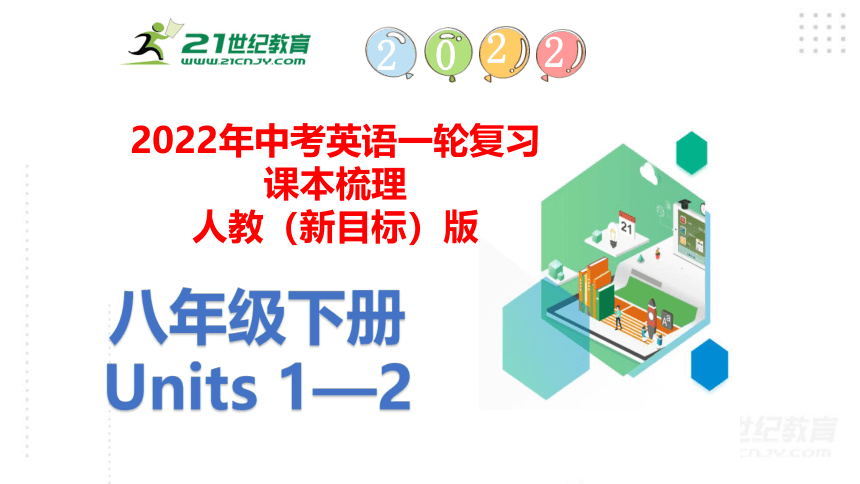 | |
| 格式 | pptx | ||
| 文件大小 | 1.3MB | ||
| 资源类型 | 试卷 | ||
| 版本资源 | 人教新目标(Go for it)版 | ||
| 科目 | 英语 | ||
| 更新时间 | 2022-01-16 16:34:52 | ||
图片预览

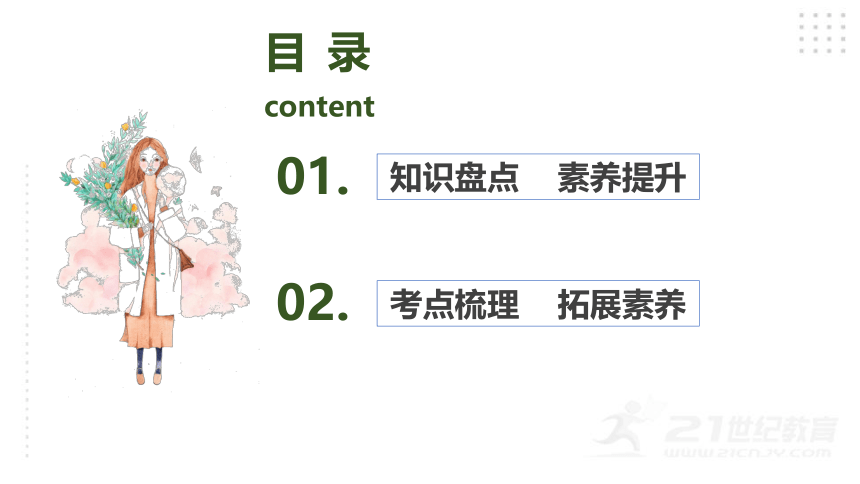
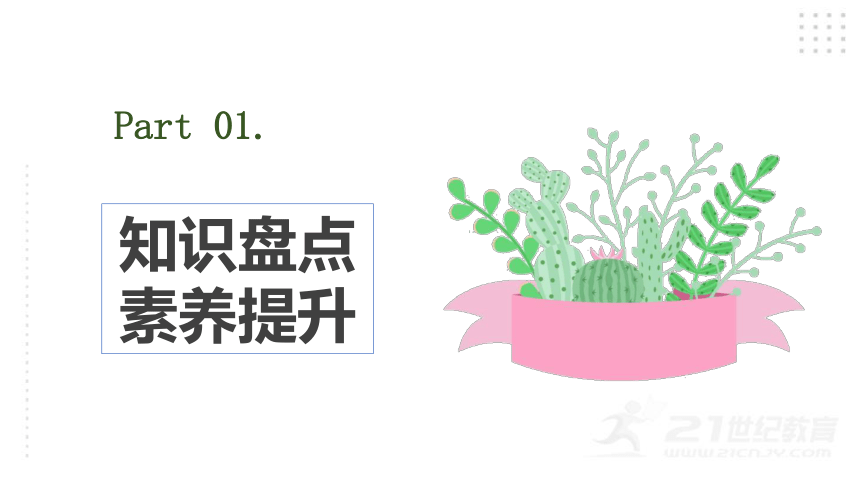
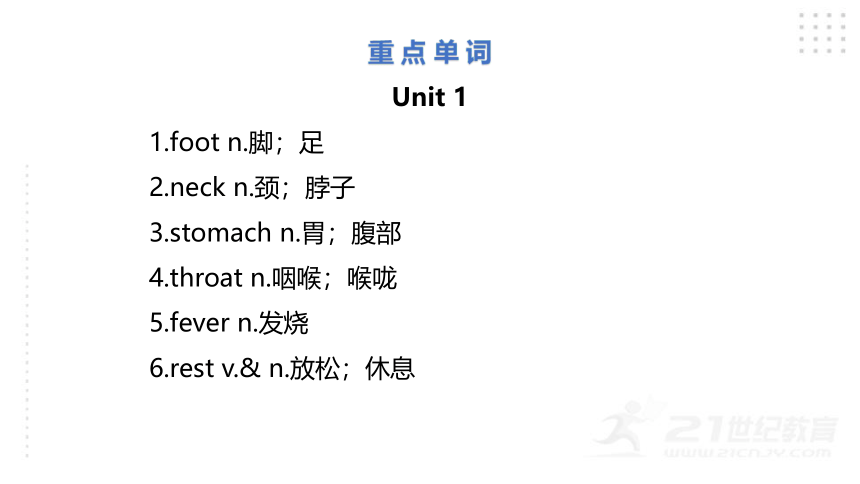
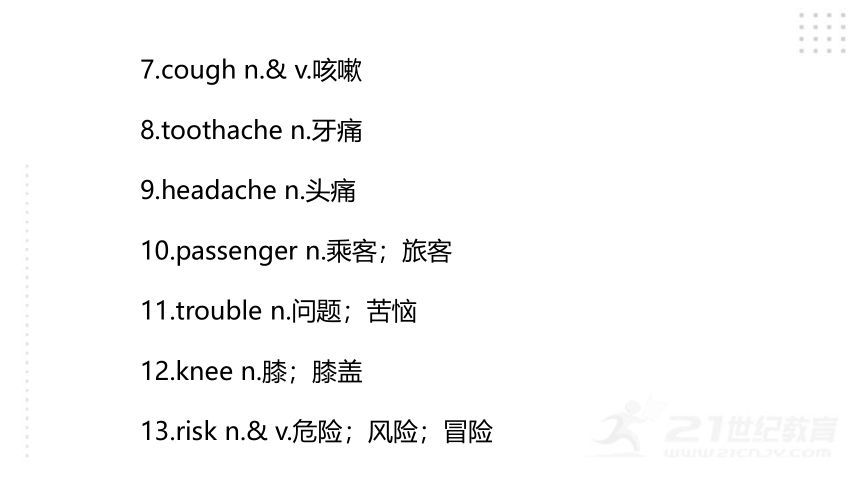
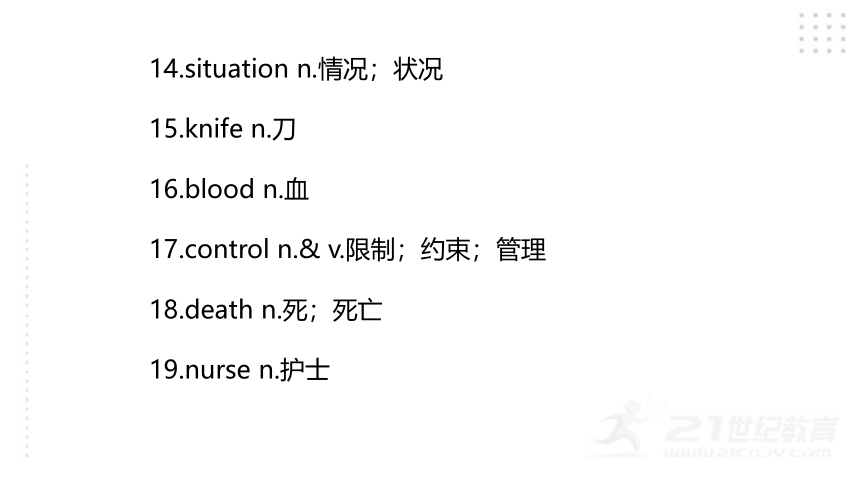
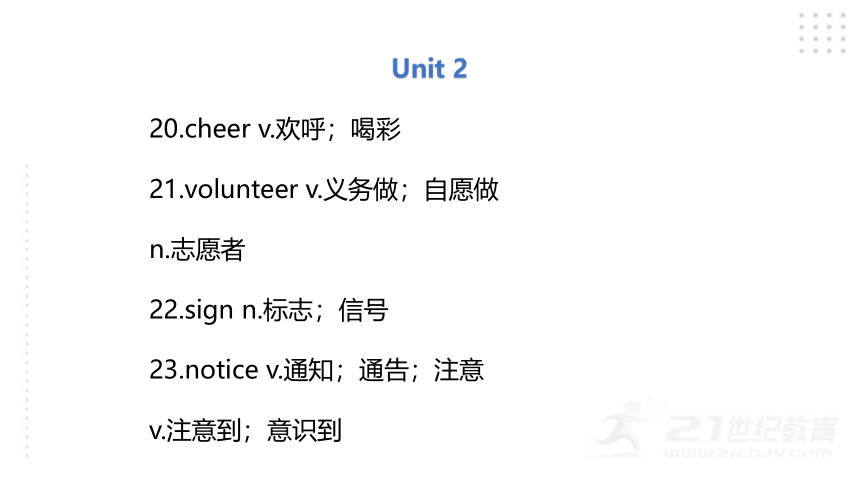
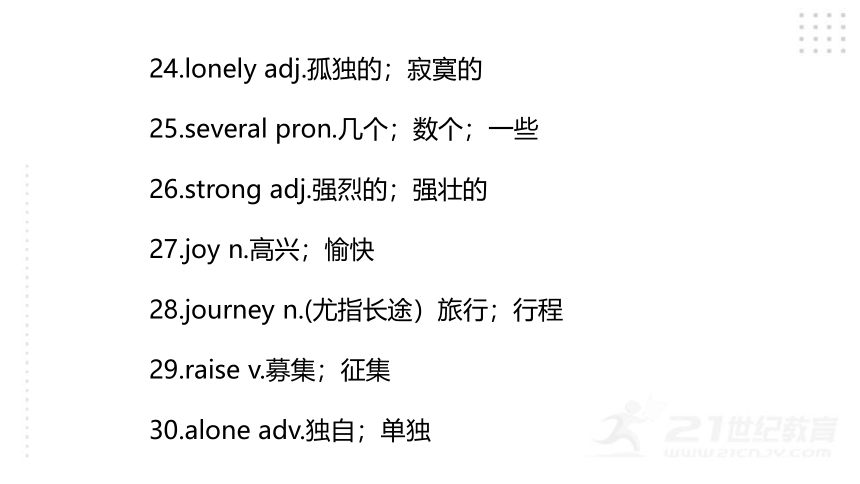
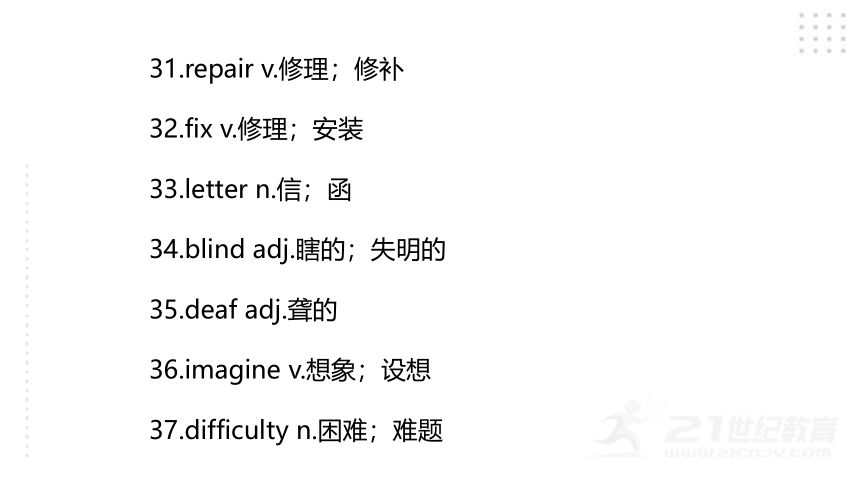
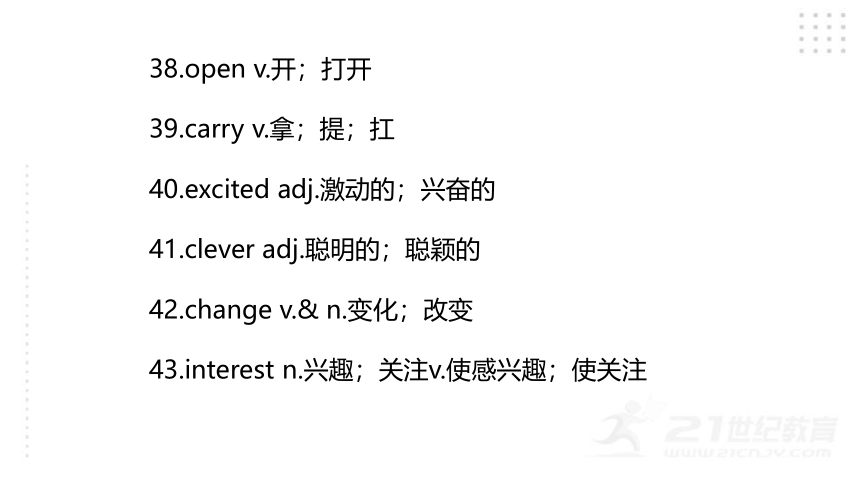
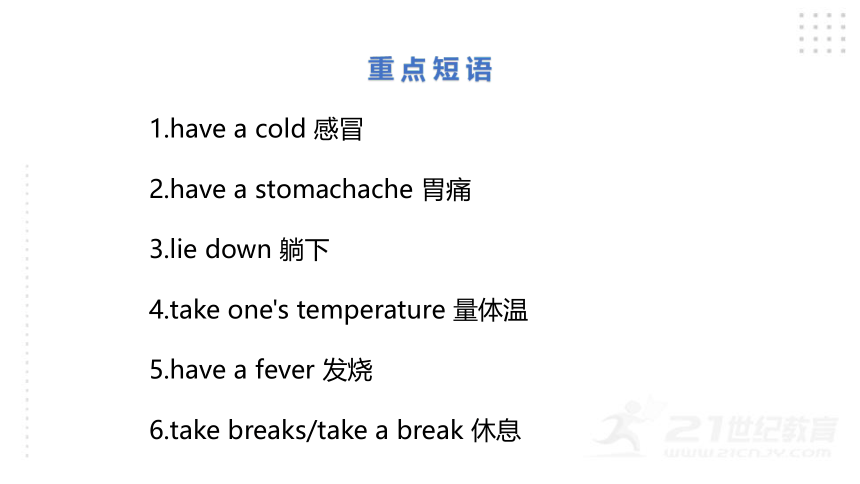
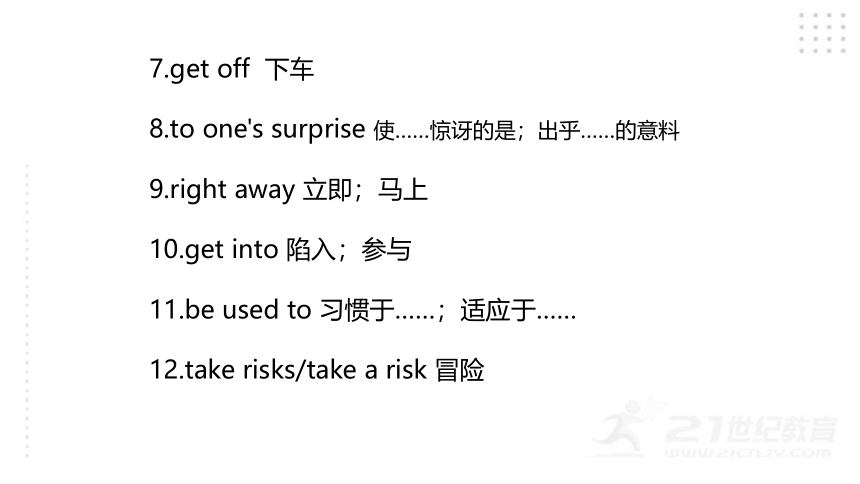
文档简介
(共59张PPT)
2
0
2
2
2022年中考英语一轮复习
课本梳理
人教(新目标)版
八年级下册
Units 1—2
知识盘点 素养提升
考点梳理 拓展素养
目录
content
01.
02.
Part 01.
知识盘点 素养提升
重 点 单 词
Unit 1
1.foot n.脚;足
2.neck n.颈;脖子
3.stomach n.胃;腹部
4.throat n.咽喉;喉咙
5.fever n.发烧
6.rest v.& n.放松;休息
7.cough n.& v.咳嗽
8.toothache n.牙痛
9.headache n.头痛
10.passenger n.乘客;旅客
11.trouble n.问题;苦恼
12.knee n.膝;膝盖
13.risk n.& v.危险;风险;冒险
14.situation n.情况;状况
15.knife n.刀
16.blood n.血
17.control n.& v.限制;约束;管理
18.death n.死;死亡
19.nurse n.护士
Unit 2
20.cheer v.欢呼;喝彩
21.volunteer v.义务做;自愿做
n.志愿者
22.sign n.标志;信号
23.notice v.通知;通告;注意
v.注意到;意识到
24.lonely adj.孤独的;寂寞的
25.several pron.几个;数个;一些
26.strong adj.强烈的;强壮的
27.joy n.高兴;愉快
28.journey n.(尤指长途)旅行;行程
29.raise v.募集;征集
30.alone adv.独自;单独
31.repair v.修理;修补
32.fix v.修理;安装
33.letter n.信;函
34.blind adj.瞎的;失明的
35.deaf adj.聋的
36.imagine v.想象;设想
37.difficulty n.困难;难题
38.open v.开;打开
39.carry v.拿;提;扛
40.excited adj.激动的;兴奋的
41.clever adj.聪明的;聪颖的
42.change v.& n.变化;改变
43.interest n.兴趣;关注v.使感兴趣;使关注
重 点 短 语
1.have a cold 感冒
2.have a stomachache 胃痛
3.lie down 躺下
4.take one's temperature 量体温
5.have a fever 发烧
6.take breaks/take a break 休息
7.get off 下车
8.to one's surprise 使……惊讶的是;出乎……的意料
9.right away 立即;马上
10.get into 陷入;参与
11.be used to 习惯于……;适应于……
12.take risks/take a risk 冒险
13.run out (of) 用尽;耗尽
14.cut off 切除
15.get out of 离开;从……出来
16.be in control of 掌管;管理
17.give up 放弃
18.clean up 打扫(或清除)干净
19.cheer up (使)变得更高兴;振奋起来
20.give out 分发;散发
21.come up with 想出;提出(主意、计划、回答等)
22.put off 推迟
23.hand out 分发
24.call up 打电话给(某人);征召
25.used to 曾经……;过去……
26.care for 照顾;非常喜欢
27.try out 参加……选拔;试用
28.fix up 修理;装饰
29.give away 赠送;捐赠
30.take after (外貌或行为)像
31.set up 建起;设立
32.make a difference 影响;有作用
词 汇 拓 展
1.lie v.→ lay (过去式)躺;平躺
→ lain (过去分词)
→ lying (现在分词)
2.hurt v.→ hurt (过去式/过去分词)(使)疼痛;受伤
3.hit v.→ hit (过去式/过去分词)击;打
4.she pron.→ herself (反身代词)她自己
5.we pron.→ ourselves (反身代词)我们自己
6.climb v.→ climber n.登山者;攀登者
7.knife n.→ knives pl.刀
8.importance n.→ important adj.重要的
9.decide v.→ decision n.决定;抉择
10.die v.→ death n.死;死亡
→ dying adj.垂死的
→ dead adj.死的;失去生命的
11.strong adj.→ strongly adv.强烈地12.feel v.→ feeling n.感觉;感触
13.own v.→ owner n.物主;主人
14.satisfy v.→ satisfaction n.满足;满意
→ satisfied adj.满足的;满意的
15.break v.→ broken adj.破损的;残缺的
16.able adj.→ disabled (反义词)丧失能力的;有残疾的
17.imagine v.→ imagination n.想象;想象力
18.difficulty n.→ difficult adj.困难的
19.excited adj.→ exciting adj.使人兴奋的;令人激动的
20.train v.→ training n.训练;培训
21.kind adj.→ kindness n.仁慈;善良
22.interest v.& n.→ interesting adj.有趣的
→ interested adj.感兴趣的
重 点 句 型
1.But to his surprise ,they all agreed to go with him.但令他惊讶的是,他们都同意和他一起去。
2. Thanks to Mr.Wang and the passengers,the man was saved by the doctors in time.多亏了王先生和乘客们,医生及时挽救了老人的生命。
3.His love for mountain climbing is so great that he kept on climbing mountains even after this experience.他对登山如此痴迷,以至于在这次(断臂)经历之后他依然继续登山。
4.They told me stories about the past and how things used to be .他们给我讲过去的生活经历,讲过去是什么样子的。
5.She could read by herself at the age of four.她在四岁时就能够独自看书了。
6.You could ask hospitals to let you visit the kids and cheer them up .你可以请求医院让你去看望孩子们并使他们振作起来。
7.You helped to make it possible for me to have Lucky.有了你的帮助,我才有可能拥有“幸运儿”(狗名)。
情 景 交 际
询问情况
1.—What's the matter with Ben /What happened to Ben 本怎么啦?
—He hurt himself.He has a sore back.他弄伤自己了。他背疼。
2.—Do you have a fever 你发烧吗?
—Yes,I do./No,I don't./I don't know.是的。/不,不发烧。/我不知道。
3.—Are you OK 你还好吗?
—No,I don't feel well./I have a headache and I can't move my neck.不,我感觉不舒服。/我头痛,脖子动不了。给出建议
4.—What should she do 她应该做什么?
—She should take her temperature.她应该量体温。
5.—Should I put some medicine on it 我应该在上面敷点药吗?
—Yes,you should./No,you shouldn't.是的,你应该。/不,你不应该。
6.—I think you should see a doctor and get an X-ray.我认为你该去看医生,照X光。
—OK,thanks.I'll do that now.好的,谢谢。我现在就去。
Part 02.
考点梳理
素养提升
—What's the matter 你怎么了?
—I have a stomachache.我胃疼。(Unit 1 P1)
【点拨】What's the matter =What's wrong/the trouble 用来询问病情或某人遇到什么麻烦、问题。其后跟询问的对象时,与介词with连用。答语常为表示身体状况或者用来表达所处困境的句式。如:
—What's wrong with the boy 这个男孩怎么了?
—He has a cold.他感冒了。
考点1
【拓展】询问“某人怎么了?”,常用以下句型:
学以致用
( B )2. —
—I don't feel very well today.I've got a pain here.
A.Can I take your temperature
B.What's wrong with you
C.Do you have a cough
D.How long have you been like this
I think you should lie down and rest.我认为你应当躺下休息。(Unit 1 P2)
【辨析】lie与lay
考点2
He lay on the beach.他躺在沙滩上。
The cinema lies in the center of the city.电影院位于市中心。
She lied to her mother.她对她妈妈撒谎了。
He laid the egg on the table carefully.他小心地把鸡蛋放在桌子上。
The cock never lays eggs.大公鸡从不下蛋。
规则是撒谎:lie-lied-lied;
不规则是躺:lie-lay-lain;
躺过就下蛋:lay-laid-laid,下蛋不规则。
巧
记
口
诀
解释:lie(撒谎)的过去式和过去分词是规则变化,lie(躺)的过去式和过去分词是不规则变化,lie(躺)的过去式是lay,lay(下蛋)的过去式和过去分词是不规则变化。
【图解助记】
学以致用
4.(2021·呼和浩特)She laid the baby down lightly on the bed and left the room quietly.
5.(2021·眉山改编)—Why were you late for class this morning
—On my way to school,I happened to see an old man lying on the ground and helped him to hospital.
6.To the west of our school lie some bookstores and a park.
As a mountain climber,Aron is used to taking risks.作为一名登山者,阿伦习惯于冒险。(Unit 1 P6)
【辨析】used to do sth.,be/get used to doing sth.,be used to do sth.,be used for (doing) sth.,be used as sth.与be used by sb.
考点3
短语 含义及用法
used to do sth. 过去常常做某事(to为不定式符号)
be/get used to (doing) sth. 习惯于……(to是介词,后接名词、代词或动名词)
be used to do sth.(=be used for doing sth.) 被用来做某事(不定式作目的状语;for短语表用途)
be used as sth. 被用作……(as意为“作为”)
be used by sb. 被……使用(by后接动作的执行者)
He used to get up at 7 o'clock.他过去常常7点起床。
They've got used to living in the countryside.他们已习惯于住在乡村。
The machine is used to cut things.=The machine is used for cutting things.这台机器是用来切割东西的。
English is used as a foreign language in China.在中国,英语被用作一门外语。
Smartphones are used by many people all over the world.全世界许多人都使用智能手机。
( B )1.(2021·百色)I used to at half past six,but now I am getting used to at seven.
A.getting up;get up B.get up;getting up
C.got up;getting up D.got up;get up
( C )2.(2021·贵港)—My grandma is used to in the countryside.
—Oh.So is my grandma.
A.live B.lives C.living D.lived
学以致用
用适当的介词填空。
3.He was used to the cold weather after he lived there for two years.
4.Stones can be used for building houses.
5.The big table can be used as a bed.
6.The machines are used by workers.
7.(2021·镇江)The managers of the big company have been used to dealing (deal) with problems online.
8.(2021·鞍山)他过去常常吸烟,但是现在他已经戒掉了。
He used to smoke,but he has already given it up.
9.(2021·襄阳)这些德国人在到襄阳前就已经习惯吃牛肉面了。(be)
These Germans had (already) been used to eating/having beef noodles before they came to Xiangyang.
Then,with his left arm,he bandaged himself so that he would not lose too much blood.然后他用左臂给自己包扎,这样不至于失血过多。(Unit 1 P6)
【辨析】so ...that ...,such ...that ...与so that(考点讲解详见P36考点5)
考点4
Aron did not give up after the accident and keeps on climbing mountains today.在遭遇意外后阿伦没有放弃,并且如今继续登山。(Unit 1 P7)
【点拨】give up意为“放弃”,为“动词+副词”构成的短语。既可单独使用,也可接名词、代词或动名词作宾语(give up doing sth.意为“放弃做某事”);当代词作宾语时,要将代词放在give与up之间,名词作宾语放在中间或后面均可。
考点5
如:David has decided to give up football at the end of this year.戴维已经决定今年年底就不再踢足球了。
Although math is very difficult,don't give it up.虽然数学很难,但是不要放弃它。
Why don't you give up smoking 你为什么不戒烟
( A )1.(2021·益阳改编)My father always tells me never to when I am in trouble.
A.give up B.put on
C.help out D.take down
2.I will never give up doing (do) sports because I hope I will be healthier.
学以致用
3.(2021·恩施)人们告诫“后浪”(年青一代),如果他们不努力,世界就会失去希望。(give)
The younger generation is told that if they give up making efforts,the world will lose hope.
学以致用
Yeah,a lot of old people are lonely.是的,很多老年人都很孤独。(Unit 2 P10)
I want to travel alone.我想独自旅行。(Unit 2 P12)
【辨析】alone与lonely
考点6
单词 词性 含义及用法 例句
alone 形容词 “独自的;单独的”,表示无人陪伴,只陈述一个客观事实,不带感彩,在句中作表语。 I was travelling alone in the lonely island.I didn't feel lonely though I was alone.我独自在荒凉的岛上旅行。虽然孤身一人,但我并不感到寂寞。
副词 “独自地;单独地”,用在实义动词后,相当于by oneself,常在句中作方式状语。 lonely 形容词 “孤独的”,感彩浓厚,强调心灵上的孤独与寂寞,常在句中作表语。 “荒凉的;偏僻的;人迹罕至的”,常用于修饰表示地点的名词,只能作定语。 ( C )1.When you feel helpless and ,just remember that you are not in the world because your friends are around you.
A.alone;alone B.alone;lonely
C.lonely;alone D.lonely;lonely
学以致用
( C )2.Lisa did the work all by herself.(同义替换)
A.together B.already C.alone D.lonely
3.(2021·烟台)The old man never feels lonely (孤独) because we often go to visit him.
4.(2021·乐山)We are not alone (独自) on the Great Way and the whole world is one family.
2
0
2
2
2022年中考英语一轮复习
课本梳理
人教(新目标)版
八年级下册
Units 1—2
知识盘点 素养提升
考点梳理 拓展素养
目录
content
01.
02.
Part 01.
知识盘点 素养提升
重 点 单 词
Unit 1
1.foot n.脚;足
2.neck n.颈;脖子
3.stomach n.胃;腹部
4.throat n.咽喉;喉咙
5.fever n.发烧
6.rest v.& n.放松;休息
7.cough n.& v.咳嗽
8.toothache n.牙痛
9.headache n.头痛
10.passenger n.乘客;旅客
11.trouble n.问题;苦恼
12.knee n.膝;膝盖
13.risk n.& v.危险;风险;冒险
14.situation n.情况;状况
15.knife n.刀
16.blood n.血
17.control n.& v.限制;约束;管理
18.death n.死;死亡
19.nurse n.护士
Unit 2
20.cheer v.欢呼;喝彩
21.volunteer v.义务做;自愿做
n.志愿者
22.sign n.标志;信号
23.notice v.通知;通告;注意
v.注意到;意识到
24.lonely adj.孤独的;寂寞的
25.several pron.几个;数个;一些
26.strong adj.强烈的;强壮的
27.joy n.高兴;愉快
28.journey n.(尤指长途)旅行;行程
29.raise v.募集;征集
30.alone adv.独自;单独
31.repair v.修理;修补
32.fix v.修理;安装
33.letter n.信;函
34.blind adj.瞎的;失明的
35.deaf adj.聋的
36.imagine v.想象;设想
37.difficulty n.困难;难题
38.open v.开;打开
39.carry v.拿;提;扛
40.excited adj.激动的;兴奋的
41.clever adj.聪明的;聪颖的
42.change v.& n.变化;改变
43.interest n.兴趣;关注v.使感兴趣;使关注
重 点 短 语
1.have a cold 感冒
2.have a stomachache 胃痛
3.lie down 躺下
4.take one's temperature 量体温
5.have a fever 发烧
6.take breaks/take a break 休息
7.get off 下车
8.to one's surprise 使……惊讶的是;出乎……的意料
9.right away 立即;马上
10.get into 陷入;参与
11.be used to 习惯于……;适应于……
12.take risks/take a risk 冒险
13.run out (of) 用尽;耗尽
14.cut off 切除
15.get out of 离开;从……出来
16.be in control of 掌管;管理
17.give up 放弃
18.clean up 打扫(或清除)干净
19.cheer up (使)变得更高兴;振奋起来
20.give out 分发;散发
21.come up with 想出;提出(主意、计划、回答等)
22.put off 推迟
23.hand out 分发
24.call up 打电话给(某人);征召
25.used to 曾经……;过去……
26.care for 照顾;非常喜欢
27.try out 参加……选拔;试用
28.fix up 修理;装饰
29.give away 赠送;捐赠
30.take after (外貌或行为)像
31.set up 建起;设立
32.make a difference 影响;有作用
词 汇 拓 展
1.lie v.→ lay (过去式)躺;平躺
→ lain (过去分词)
→ lying (现在分词)
2.hurt v.→ hurt (过去式/过去分词)(使)疼痛;受伤
3.hit v.→ hit (过去式/过去分词)击;打
4.she pron.→ herself (反身代词)她自己
5.we pron.→ ourselves (反身代词)我们自己
6.climb v.→ climber n.登山者;攀登者
7.knife n.→ knives pl.刀
8.importance n.→ important adj.重要的
9.decide v.→ decision n.决定;抉择
10.die v.→ death n.死;死亡
→ dying adj.垂死的
→ dead adj.死的;失去生命的
11.strong adj.→ strongly adv.强烈地12.feel v.→ feeling n.感觉;感触
13.own v.→ owner n.物主;主人
14.satisfy v.→ satisfaction n.满足;满意
→ satisfied adj.满足的;满意的
15.break v.→ broken adj.破损的;残缺的
16.able adj.→ disabled (反义词)丧失能力的;有残疾的
17.imagine v.→ imagination n.想象;想象力
18.difficulty n.→ difficult adj.困难的
19.excited adj.→ exciting adj.使人兴奋的;令人激动的
20.train v.→ training n.训练;培训
21.kind adj.→ kindness n.仁慈;善良
22.interest v.& n.→ interesting adj.有趣的
→ interested adj.感兴趣的
重 点 句 型
1.But to his surprise ,they all agreed to go with him.但令他惊讶的是,他们都同意和他一起去。
2. Thanks to Mr.Wang and the passengers,the man was saved by the doctors in time.多亏了王先生和乘客们,医生及时挽救了老人的生命。
3.His love for mountain climbing is so great that he kept on climbing mountains even after this experience.他对登山如此痴迷,以至于在这次(断臂)经历之后他依然继续登山。
4.They told me stories about the past and how things used to be .他们给我讲过去的生活经历,讲过去是什么样子的。
5.She could read by herself at the age of four.她在四岁时就能够独自看书了。
6.You could ask hospitals to let you visit the kids and cheer them up .你可以请求医院让你去看望孩子们并使他们振作起来。
7.You helped to make it possible for me to have Lucky.有了你的帮助,我才有可能拥有“幸运儿”(狗名)。
情 景 交 际
询问情况
1.—What's the matter with Ben /What happened to Ben 本怎么啦?
—He hurt himself.He has a sore back.他弄伤自己了。他背疼。
2.—Do you have a fever 你发烧吗?
—Yes,I do./No,I don't./I don't know.是的。/不,不发烧。/我不知道。
3.—Are you OK 你还好吗?
—No,I don't feel well./I have a headache and I can't move my neck.不,我感觉不舒服。/我头痛,脖子动不了。给出建议
4.—What should she do 她应该做什么?
—She should take her temperature.她应该量体温。
5.—Should I put some medicine on it 我应该在上面敷点药吗?
—Yes,you should./No,you shouldn't.是的,你应该。/不,你不应该。
6.—I think you should see a doctor and get an X-ray.我认为你该去看医生,照X光。
—OK,thanks.I'll do that now.好的,谢谢。我现在就去。
Part 02.
考点梳理
素养提升
—What's the matter 你怎么了?
—I have a stomachache.我胃疼。(Unit 1 P1)
【点拨】What's the matter =What's wrong/the trouble 用来询问病情或某人遇到什么麻烦、问题。其后跟询问的对象时,与介词with连用。答语常为表示身体状况或者用来表达所处困境的句式。如:
—What's wrong with the boy 这个男孩怎么了?
—He has a cold.他感冒了。
考点1
【拓展】询问“某人怎么了?”,常用以下句型:
学以致用
( B )2. —
—I don't feel very well today.I've got a pain here.
A.Can I take your temperature
B.What's wrong with you
C.Do you have a cough
D.How long have you been like this
I think you should lie down and rest.我认为你应当躺下休息。(Unit 1 P2)
【辨析】lie与lay
考点2
He lay on the beach.他躺在沙滩上。
The cinema lies in the center of the city.电影院位于市中心。
She lied to her mother.她对她妈妈撒谎了。
He laid the egg on the table carefully.他小心地把鸡蛋放在桌子上。
The cock never lays eggs.大公鸡从不下蛋。
规则是撒谎:lie-lied-lied;
不规则是躺:lie-lay-lain;
躺过就下蛋:lay-laid-laid,下蛋不规则。
巧
记
口
诀
解释:lie(撒谎)的过去式和过去分词是规则变化,lie(躺)的过去式和过去分词是不规则变化,lie(躺)的过去式是lay,lay(下蛋)的过去式和过去分词是不规则变化。
【图解助记】
学以致用
4.(2021·呼和浩特)She laid the baby down lightly on the bed and left the room quietly.
5.(2021·眉山改编)—Why were you late for class this morning
—On my way to school,I happened to see an old man lying on the ground and helped him to hospital.
6.To the west of our school lie some bookstores and a park.
As a mountain climber,Aron is used to taking risks.作为一名登山者,阿伦习惯于冒险。(Unit 1 P6)
【辨析】used to do sth.,be/get used to doing sth.,be used to do sth.,be used for (doing) sth.,be used as sth.与be used by sb.
考点3
短语 含义及用法
used to do sth. 过去常常做某事(to为不定式符号)
be/get used to (doing) sth. 习惯于……(to是介词,后接名词、代词或动名词)
be used to do sth.(=be used for doing sth.) 被用来做某事(不定式作目的状语;for短语表用途)
be used as sth. 被用作……(as意为“作为”)
be used by sb. 被……使用(by后接动作的执行者)
He used to get up at 7 o'clock.他过去常常7点起床。
They've got used to living in the countryside.他们已习惯于住在乡村。
The machine is used to cut things.=The machine is used for cutting things.这台机器是用来切割东西的。
English is used as a foreign language in China.在中国,英语被用作一门外语。
Smartphones are used by many people all over the world.全世界许多人都使用智能手机。
( B )1.(2021·百色)I used to at half past six,but now I am getting used to at seven.
A.getting up;get up B.get up;getting up
C.got up;getting up D.got up;get up
( C )2.(2021·贵港)—My grandma is used to in the countryside.
—Oh.So is my grandma.
A.live B.lives C.living D.lived
学以致用
用适当的介词填空。
3.He was used to the cold weather after he lived there for two years.
4.Stones can be used for building houses.
5.The big table can be used as a bed.
6.The machines are used by workers.
7.(2021·镇江)The managers of the big company have been used to dealing (deal) with problems online.
8.(2021·鞍山)他过去常常吸烟,但是现在他已经戒掉了。
He used to smoke,but he has already given it up.
9.(2021·襄阳)这些德国人在到襄阳前就已经习惯吃牛肉面了。(be)
These Germans had (already) been used to eating/having beef noodles before they came to Xiangyang.
Then,with his left arm,he bandaged himself so that he would not lose too much blood.然后他用左臂给自己包扎,这样不至于失血过多。(Unit 1 P6)
【辨析】so ...that ...,such ...that ...与so that(考点讲解详见P36考点5)
考点4
Aron did not give up after the accident and keeps on climbing mountains today.在遭遇意外后阿伦没有放弃,并且如今继续登山。(Unit 1 P7)
【点拨】give up意为“放弃”,为“动词+副词”构成的短语。既可单独使用,也可接名词、代词或动名词作宾语(give up doing sth.意为“放弃做某事”);当代词作宾语时,要将代词放在give与up之间,名词作宾语放在中间或后面均可。
考点5
如:David has decided to give up football at the end of this year.戴维已经决定今年年底就不再踢足球了。
Although math is very difficult,don't give it up.虽然数学很难,但是不要放弃它。
Why don't you give up smoking 你为什么不戒烟
( A )1.(2021·益阳改编)My father always tells me never to when I am in trouble.
A.give up B.put on
C.help out D.take down
2.I will never give up doing (do) sports because I hope I will be healthier.
学以致用
3.(2021·恩施)人们告诫“后浪”(年青一代),如果他们不努力,世界就会失去希望。(give)
The younger generation is told that if they give up making efforts,the world will lose hope.
学以致用
Yeah,a lot of old people are lonely.是的,很多老年人都很孤独。(Unit 2 P10)
I want to travel alone.我想独自旅行。(Unit 2 P12)
【辨析】alone与lonely
考点6
单词 词性 含义及用法 例句
alone 形容词 “独自的;单独的”,表示无人陪伴,只陈述一个客观事实,不带感彩,在句中作表语。 I was travelling alone in the lonely island.I didn't feel lonely though I was alone.我独自在荒凉的岛上旅行。虽然孤身一人,但我并不感到寂寞。
副词 “独自地;单独地”,用在实义动词后,相当于by oneself,常在句中作方式状语。 lonely 形容词 “孤独的”,感彩浓厚,强调心灵上的孤独与寂寞,常在句中作表语。 “荒凉的;偏僻的;人迹罕至的”,常用于修饰表示地点的名词,只能作定语。 ( C )1.When you feel helpless and ,just remember that you are not in the world because your friends are around you.
A.alone;alone B.alone;lonely
C.lonely;alone D.lonely;lonely
学以致用
( C )2.Lisa did the work all by herself.(同义替换)
A.together B.already C.alone D.lonely
3.(2021·烟台)The old man never feels lonely (孤独) because we often go to visit him.
4.(2021·乐山)We are not alone (独自) on the Great Way and the whole world is one family.
